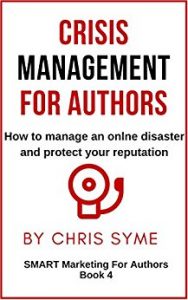
Today’s guest post is by social media expert Chris Syme (@cksyme), author of Crisis Management for Authors: How to Manage an Online Disaster and Protect Your Reputation.
It can happen to you. Your carefully built author business and your reputation can come under attack and threaten to disrupt your livelihood and your personal life. But you can help prevent a crisis in the first place by using some simple engagement strategies.
When we think of engagement we usually think of social media and newsletter content, building relationships, and getting people to click on a link. But there are several benefits of developing engagement strategies that help prevent a crisis:
- Building a family of invested ambassadors that will advocate for you in a crisis will give you the freedom to ask for help, if you need it.
- Identifying and cultivating goodwill conversations with key influencers can help extend your reach in a crisis. Sometimes you may need help getting a message out quickly to as many people as possible on back channels.
- Developing working relationships with media representatives in the social space who can also be advocates on your behalf may come in handy when you are being crucified in the arena of popular opinion.
You should develop a social media presence before a crisis hits so you won’t look like a novice or “pretender” in the social space. Communities don’t mind doing you the favor of advocacy in a crisis if you have nurtured the relationship already. But if you just “appear” on social media during a negative event, you will be ignored or even targeted for your behavior. Never try and “build a following” during a crisis. Use the following you’ve already built.
Build a Core Group When There Is No Crisis
Advocates can do more to shorten a crisis than anything you can say or do. I have personally seen many crises cut short or averted by purposeful planned intervention by engaged friends, fans, and press. The sum total of your engaged network constitutes your reputation. And reputation is your biggest asset in a crisis.
We’re not talking about taking to the internet to activate an army of positive-talking do-gooders here. We’re talking about building a network of core readers, author friends, media people, and industry friends who know you, like your books, and would do you a strategic favor if asked. Advocacy needs to be organic, not staged.
Side note: Having engaged readers means selling less and giving more. I am saddened by the practice of using social media, email, and websites to just say, “Buy my latest book.” That tactic builds zero loyalty. Followers are interested in building a relationship, in connecting with you as a person as well as an author. This can make authors uncomfortable, but it’s the best way to build a lifelong loyal fan. If you want to build a positive reputation as an author, give more than you take.
Lay the Groundwork for Prevention
Much cattle, much care, as the British say. The “other” side of engage is that you have to put measures in place to monitor your accounts and lay the groundwork for crisis prevention. This isn’t about being an online tyrant; it’s about creating an atmosphere of safety, transparency, and civility. Implement these procedures as part of crisis prevention. Here are the housekeeping tasks.
1. Create a posting policy on your blog and all your social media pages. Moderate comments on your blog instead of letting them auto-populate. This gives you the leverage to delete and block people who are trolls or exhibit inappropriate behavior. Make your commenting policy clear near the comments section and on your website’s privacy policy page.
On your Facebook page, note your commenting policy on the About tab. In Facebook groups, put posting and comment policy in your group description or on a document in your Files tab. You can also create Group Rules in the Manage Group tab in your group. Here is a link to my social media commenting policy as an example.
2. Monitor your pages and groups daily. Check your notifications to find out what is new. Don’t be afraid to hide or delete posts or block people who do not follow your page or group guidelines. I usually message people to let them know what I’ve done and why.
3. Familiarize yourself with deleting, blocking, and reporting features on all the social media channels where you maintain a presence. Know how to report inappropriate content and register a complaint or concern on every network where you’re active. It’ll save you a lot of time later when you need to use those features.
4. Don’t engage in dishonest online practices. For example, don’t buy followers or reviews or add email subscribers that haven’t opted in. Bad habits invite crisis. Be honest and transparent—and remember you don’t own that Facebook page. You’re renting it.
Crisis prevention strategies lower the chances of a negative event appearing on the horizon. But it something bad does happen, here are tips on managing an online crisis.
If you found this post helpful, check out Chris Syme’s Crisis Management for Authors: How to Manage an Online Disaster and Protect Your Reputation.
Chris Syme is a 20-year veteran of the communications and marketing industry and is the founder of CKSyme Media Group. She is an author and speaker on the topics of social media marketing and reputation management. She is a former university media relations professional and crisis management consultant for college athletic departments, businesses, and sports event venues. Chris also co-hosts the popular Smarty Pants Book Marketing Podcast with her daughter, USA Today bestselling author R.L. (Becca) Syme.


Amen to all the above, and triple for #4 about not “buying” reviews, likes, or whatever else there is in the marketplace of dishonest Internet practices. Live a clean, thoughtful and helpful virtual life.
Thank you, Chris Syme, for this good post.
You are welcome. Glad you liked the post.
I work with a small artist studio and we recently experienced a very weird “on-line crisis” of our own — we had a mass UNSUBSCRIBE event involving 350+ of our contacts after sending an email about workshops [similar to what Jane Friedman sends out on M/C] and no different than hundreds of others we have sent over the past 6 years. Mailchimp’s response was do not use a free email [like @icloud or gmail] – their explanation was essentially spam filters clicked all the links including the UNSUBSCRIBE in the footer and ooops….too bad ! The only way apparently to get these folks back is for them to re-subscribe themselves. Have you heard of this before ? Do you have any advice for solving our “online crisis” ?
Thanks in advance ! I enjoyed your article.
Interesting explanation from Mail Chimp–I am not sure what all happened there but I’ve never heard of spam filters automatically unsubscribing for people unless that is a setting they put into place. Then, if your email has the unfortunate landing place of the spam filter, that is what will happen. There are a lot of “changed settings” out there since people started to get inundated with GDPR emails and other privacy emails from companies they haven’t heard from in years. People are starting to have a lower tolerance for “acquaintance” emails. Unfortunately, there is really nothing else you can do about that. I’ve never heard of anything like this.
One suggestion I can give (and this may be something you’re already doing) is make sure you emails are interactive on occasion–give them a question or an offer or a freebie that requires they reply to your email. And then follow up, of course. When that interaction occurs, email providers tend to read that as engagement and your emails are less likely to show up in the promotions or spam folders. The other thing you can do is to educate your gmail subscribers to make they sure they put your email in their contacts so they can continue to keep in touch. Good luck!
Hi Chris: I haven’t heard of this specific scenario before, but I am aware of the problems associated with using free email addresses. Similar to Chris Syme, I’m afraid I don’t know of any solutions to this type of mass unsubscribe.
[…] Chris Syme suggests ways to be prepared for when you are the victim of an online attack. […]